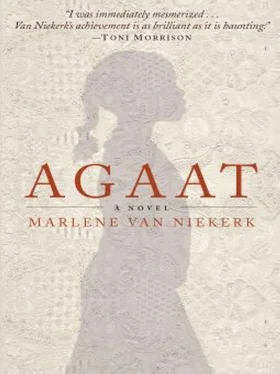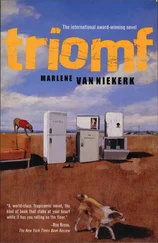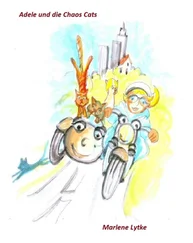And then there was the moment, after breakfast, when Agaat overplayed her hand, when Jakkie had to promise her solemnly that he wouldn’t drink any more on his birthday, and that he would make a nice speech. That’s as far as you could hear, before Agaat went into her room.
He stood talking over the half-door.
On my own birthday, Gaat?! he exclaimed. He averted his face from the door of the outside room. You were looking out of the kitchen door, saw the expression come over his face, the one you’d so often seen in Jak, the desire to inflict hurt.
You saw Agaat appear in the doorway. You saw her catching Jakkie’s glance.
The next sentence you could only partially make out.
Then you can explain it! was what it sounded like, and: No, I’m not going to write anything, next thing it will find its way into the wrong hands. So you go ahead and write something! Think up something!
Was that what you heard? His face was half inside Agaat’s door. Then he pulled back his head and the sun fell on his brown curls, long, you thought, for an officer who’d only just been granted a pass.
Well, he said, his hands on the half-door, if I’m not even allowed to drink on my own birthday, and if I have to pronounce according to your precepts, you heard him say, then you, my dear Agaat, will get into the plane this evening so that I can show you what Grootmoedersdrift looks like from up there! A full moon has been requisitioned especially for you! Wonderland by Night!
Jak was coming from the direction of the sitting room, walked past you in the kitchen, out into the backyard. He heard what Jakkie was saying. They laughed together at the prospect of loading Agaat into the aeroplane. They were on their way to inspect the fuel supply and the landing strip.
Those were the movements of that morning, the voices, the sentences, the faces in doorways, the backs, the fronts, the standing still, the turning away, the walking past.
You waited as the feast continued into evening, the torches and the fires lit, the silhouettes of skewered animals rotating on spits. Grotesque it looked to you. And smelt too, the air dense with roasted flesh. Witches’ Sabbath. But who were the witches? Surely not these cordial effusive people who’d come from far and wide for your son’s birthday? Perhaps I’m psychotic, you thought, perhaps I’ve been dependent on my medication for so long that I degenerate into an enemy of the people if I skip a day. That’s what Jak always said: Take your pills, Milla, so that you can shut up while the men make war.
You tried in vain to vanquish the thoughts. But you kept looking out for the first stirrings of mischief as the great bowls of salad and the baskets of bread were carried in under Agaat’s command. You tried to keep a clear line of sight as you helped to serve the people, all the old acquaintances, and their children who were gathered there like replicas unto the third and the fourth generation. You couldn’t snap out of it. All the convivial noises sounded so false to you. Even Beatrice and Thys, your oldest friends, aroused your distrust. They were the dominee’s confidants. They would carry report of every guffaw that was too loud and every note that was false and every drop that was drunk in excess. To the nearest hundred rand they’d be able to estimate the cost of the whole thing. They’d be able to calculate the tithe that would be proportionate to the cost and submit it to the representative of God in the Swellendam district and he would in his own time and season come and claim it for the swelling of the church coffers. You could talk to them, to protect Agaat, to speak to Jak. You could try to talk to Dominee himself.
But what would they be able to do about it? About your presentiment that a slow explosion was blowing all of Grootmoedersdrift into hundreds of shards and chunks? You were alone with the sensation. You tried to shake it off, had coffee brought to you to bring you to your senses. Lack of sleep, you thought.
There were the sallow Dieners of Vreugdevol with their smooth blue-black hair, pure Malay, you realised for the first time. Pass for white, whatever that might mean here on the other side of Sir Lowry’s Pass. The heads were bowed low over the plates, the gills shone as they peered at each other around the white wrought-iron table, as if they were engaged in an eating contest. You went across to them to try to rid yourself of the odd perspective, but they were so engrossed in stuffing themselves, they hardly greeted you.
So then for want of something more constructive to do you took a jug of ice to the Froneman table. For there wife and children with woe-begone eyes were sucking away at lukewarm glasses of cooldrink under the stern gaze of their teetotal father.
Ice, you said, try a bit of ice, it makes everything taste better.
Like somebody from the Salvation Army you sounded to your own ears. They smirked at you half-heartedly.
To one side at their own table were the Killjoys of Loch Maguire. This evening, you thought, their melancholy was extra evident. Pol Knoblauch, the bluebeard with the stiff neck, people said he fiddled with the farm labourers’ little boys, and his wife the soprano of the church gallery. Every week at the gynaecologist’s for indeterminate complaints, it was said.
And the rich Meyers family of Konstandhof, the seven brothers, all with the fine features and the little high-pitched voices, all of them with the glad eye and the one undescended ball as the rumour ran. And their Meyers sisters and female cousins with the mad streak, the whole lot of them, either worked up or down with pills.
Do I also look like that? you wondered. In the faint light of the marquee your red dress appeared black when you looked down. The sleeves felt too heavy on your arms. It felt as if you were moving ever more slowly.
Suddenly Gawie Tredoux was next to you. Just standing there, without a word. His voice when he spoke was tired.
Are you thinking what I’m thinking, Milla? At the best of times our people are fodder for low-brow soap operas, at the worst for old men with grand plans. And all the young ones want to do nowadays is surf and smoke dagga and play guitar.
You looked at him. He’d aged. Got dumped by his wife. His son a member of some rock group or other that toured all over the country with protest songs.
Look after yourself well, Milla, he said, you know I’m always there if you need me. He squeezed your shoulder.
Thank you for your trouble, tell Agaat as well, everything tip-top as usual, but I’ll be on my way now, not in the mood for a party this evening, you neither, it seems to me, but that’s life, old girl, just grin and bear it, tomorrow’s another day.
So as not to subside into tears, you betook yourself to the hand-picked wives of the Meyers brothers, a harem of shared resentment under the command of their mother-in-law, the painted-up old matriarch of whom it was rumoured that she’d been a photo model in her youth. In spite of her advanced age it was very clear in the candlelight where her sons’ high cheekbones had sprung from. Half maliciously, half gloatingly, her daughters-in-law sat by her and complimented you on the feast, on your son, on your husband. They were sisters under duress. Heir mares. Assessed on the hind-quarters and bought in for the purpose. Fertiliser Princesses. Co-op Queens. Style, Overberg Barbie, as Jak would say. You could easily spot the sons, the precocious lordliness with which they were appraising the girls.
And there was Jakkie amid it all, amiability itself. He’d kept to his word, it seemed to you. He greeted, served, endured. He replied to Jak’s speech, albeit not with great warmth, correctly and with the proper number of tame jokes. He expressed his thanks. My dear mother, my mainstay of a father. The only sign of a more alert, more intelligent creature under all the formalities were the special words full of double meanings to Agaat whom he had called to the front next to him during his speech.
Читать дальше












